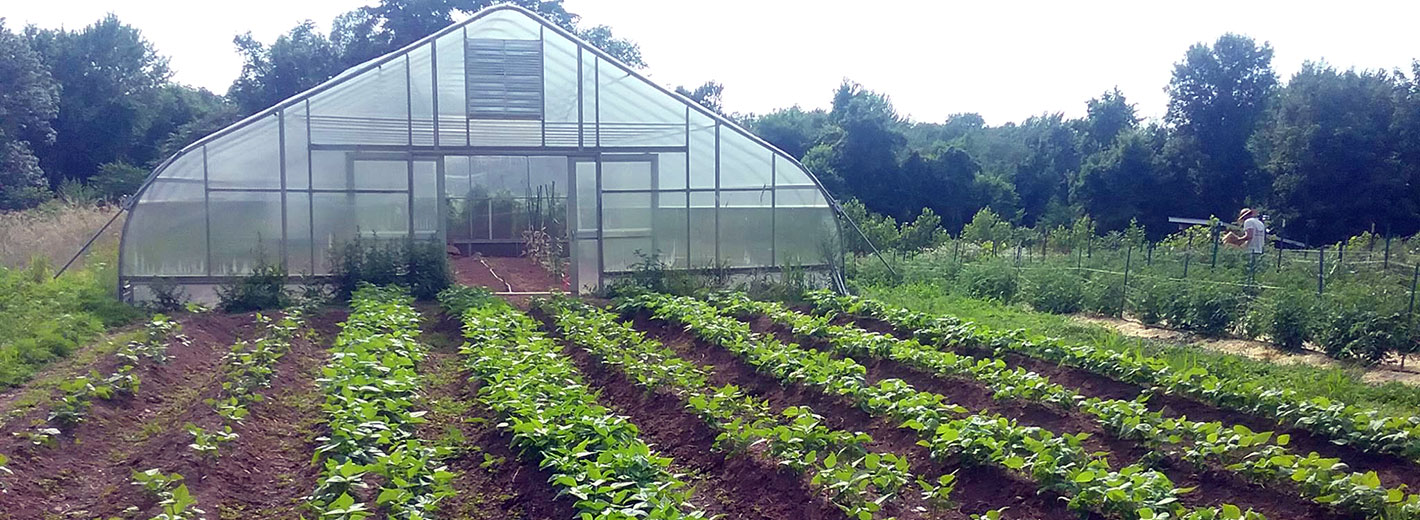
The Student Activist Grant Program from Bon Appétit Management Company
In honor of the 10th anniversary of the Bon Appétit Fellowship Program, we awarded ten $1,000 grants to student groups with compelling projects to improve food system sustainability. We received almost 50 applications from campuses we serve around the country. We are inspired by all the great ideas these student-activists suggested and are excited to announce the 10 finalists, including the People’s Choice winner!
(Find the details of their projects via the links below)
- Case Western Reserve University (Humanitarian Design Corps Local Team): A solar-powered, temperature-responsive ventilation system that will allow the campus farm’s hoop houses to be used to their full potential year round.
- Claremont McKenna College (Food Recovery Network): A brand new set of reusable, food-safe bins for transporting excess edible food from campus to hunger relief organizations.
- DePauw University (Sustainability and Leadership Program): Purchase infrastructure for large-scale composting, including multiple compost bins, large heavy-duty tarps, red wiggler worms, shovels and pitchforks, and signage for the compost piles/windrows, to be located at the campus farm.
- Goucher College (Agriculture Cooperative): Make the 5,000 square foot campus farm a more inviting and healing space by buying more perennials, including fruit bushes; compost for the raised beds; seeds for annuals; and tools and other garden items such as a new wheelbarrow, hoes, stakes, etc.
- Johns Hopkins University (Enactus JHU): Address food security in Baltimore by teaching residents how to grow fresh food at home by using a compact hydroponics system.
- Massachusetts Institute of Technology (Waste Watchers): Fund a food waste awareness campaign, including educational information sessions, posters, waste audit materials (bins, gloves, and scale), and survey incentives.
- Savannah College of Art and Design (SCAD Net Impact & SCAD Back40): Pilot a kitchen food-scrap landfill diversion program for SCAD Back40, a flourishing organic farm, apiary, and model for sustainable food systems, including a coffee-ground compost system for mushroom farming.
- University of Chicago (Phoenix Sustainability Initiative (PSI) – Service Group): Help buy gardening supplies (e.g. seedlings, soil, tools) to engage Chicago elementary-school students in lessons on climate change, sustainability, natural gardening, and permaculture.
- Wesleyan University (Long Lane Farm): Fund professional repair of Long Lane farm’s two hoop houses, which are crucial to the farm’s vegetable production in the winter and help it grow food for Bon Appétit, the North End Farmers’ Market, and Middletown food justice organizations.
- People’s Choice Winner — Wheaton College (Student Government’s Campus Sustainability Committee): Build a campus garden, to give students the opportunity to participate in their own food production, address local food insecurity, and teach the importance of sustainability.
The funds will be distributed in November, and we’ll hear back from all the winners at the end of the academic year with a brief report back on their progress, which we plan to share on our blog and company magazine.
About the Bon Appétit Fellowship Program
The Bon Appétit Management Company leadership team created the Bon Appetit Fellowship Program in 2009 to help young food-systems activists learn about sustainable food issues firsthand, participate in the company’s work to make change, and educate their peers. Have questions or interested in the Fellowship Program? Learn more here.
Case Western Reserve University | Project Category: Campus Farms and Gardens
Humanitarian Design Corps Local Team
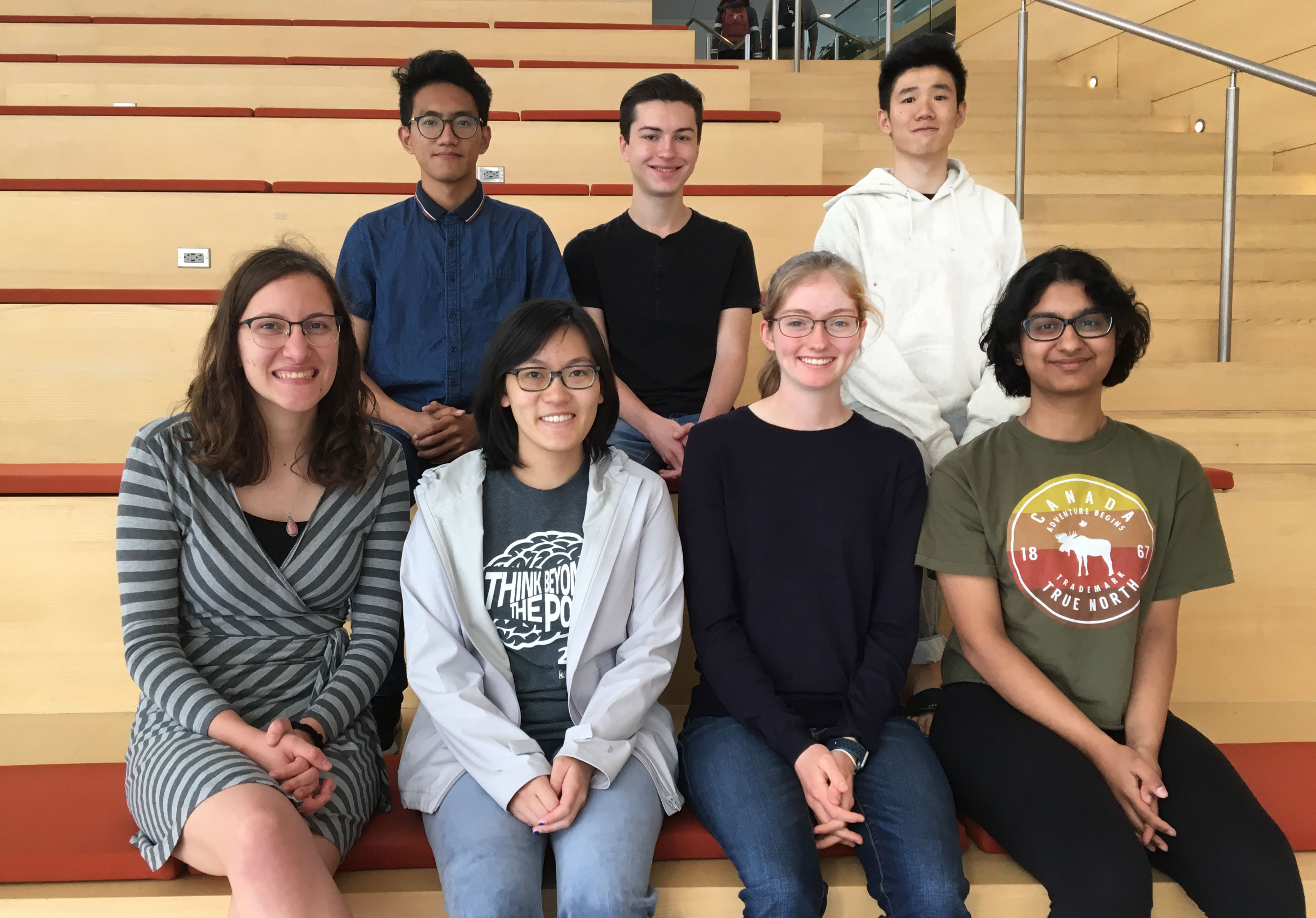
What would you do with $1,000?
As a student group at Case Western Reserve University (CWRU), we would utilize these funds to buy materials to construct a solar-powered ventilation system for the hoop houses in the CWRU farm. The hoop houses, which were funded by Bon Appetit, have been beneficial for growing produce for the campus and other restaurants that collaborate with Bon Appetit. However, due to a lack of ventilation, the hoop houses are not being used to their full potential. The internal temperature is too high for healthy plant growth and comfortable work conditions, rendering them unusable for many months of the year. Our goal is to design and install a temperature-responsive ventilation system: once the sensors detect a temperature exceeding 85 degrees Fahrenheit, the fans in the hoop house would turn on automatically. In addition, we aim to program an app that can act as a manual switch for the fans. Solar energy will power the Raspberry Pi microcontroller, which will be used to monitor and program the system, and the fans.
CWRU and Humanitarian Design Corps strive to be a role model in utilizing renewable energy, as the core values of the university and the farm include education and research. Using solar energy would be one step closer to engineering for a cleaner environment. If awarded this grant, we would allocate the funds toward purchasing the solar panels and the Raspberry Pi, allowing us to implement the ventilation system for the hoop houses as soon as possible.
JUMP TO TOP
Claremont McKenna College | Project Category: Waste Prevention and Reduction
Food Recovery Network, CMC Chapter
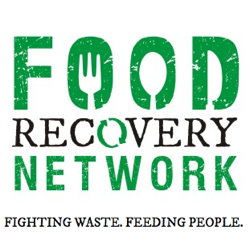 What would you do with $1,000?
What would you do with $1,000?
With $1,000, I would buy new food transportation bins for the CMC Food Recovery Network (FRN) club. I have been the CMC FRN president for the past three years and I am really excited about the program this semester: we have great student involvement and we already have a schedule filled out for the entire semester with a driver and an assistant to transport food three times a week! However, last week, the new General Manager for Collins Dining Hall informed me that the bins we have used in previous years, under different management, are not food safe. Pam even showed me one of our bins with plastic peeling off of the corner. She told me she could not send food in these containers.
For now, we are using aluminum, one-use trays to transport the food. This is obviously not ideal, as we are trying to increase sustainability. I have been working with the ASCMC Clubs and Organizations chair to try to scrape together enough money to fund a new shipment of food-safe bins, but this has proven challenging, as the bins run about $40 per bin and we would need at least 12. An extra $1,000 would be so helpful in keeping this organization running as sustainably as possible.
JUMP TO TOP
DePauw University | Project Category: Waste Prevention and Reduction
Sustainability and Leadership Program (SLP)
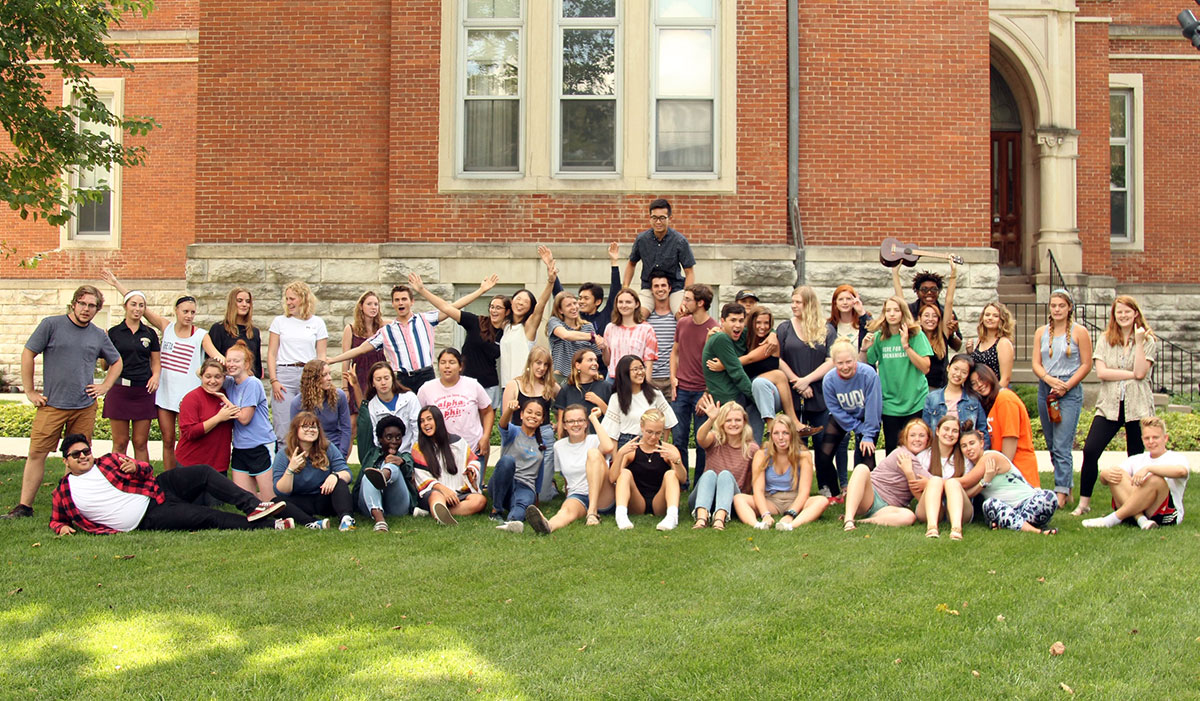
What would you do with $1,000?
If we were to be given $1,000, we would use the money to create infrastructure for large-scale composting on DePauw University’s campus. Currently, we only have a small operation in place which consists of a few student interns collecting the coffee grounds from all Bon Appetit cafes on campus. These coffee grounds, along with damaged and rotten farm produce, are simply dumped onto an unmanaged pile. Our plan would be to expand this so that we collect pre and post consumer compost from multiple greek organizations, a smoothie cafe on campus, and our main dining hall. We would use the money to purchase multiple compost bins, large heavy-duty tarps, red wiggler worms, shovels and pitchforks, and signage for the compost piles/windrows, which would be located at our campus farm. The compost bins would be left at the collection sites and used to bring food waste to the farm. The tarps would be used to cover the piles/windrows during the winter in order to keep the internal temperature of the piles up. The worms would be used to increase the speed at which the food waste is converted to compost, and signs would be used to educate members of our campus and community about composting. The signs would also help to denote the ages of the piles.
This project would be important on our campus because the farm spends money on compost every year in order to increase the soil quality. At the same time, large amounts of food are wasted every day on our campus. We could fix the first problem by utilizing the second problem, however we do not have the necessary resources to make this happen. This grant would allow us to create infrastructure for campus-wide composting which would reduce food waste and benefit our campus farm.
JUMP TO TOP
Goucher College | Project Category: Campus Farms and Gardens
Agriculture Cooperative
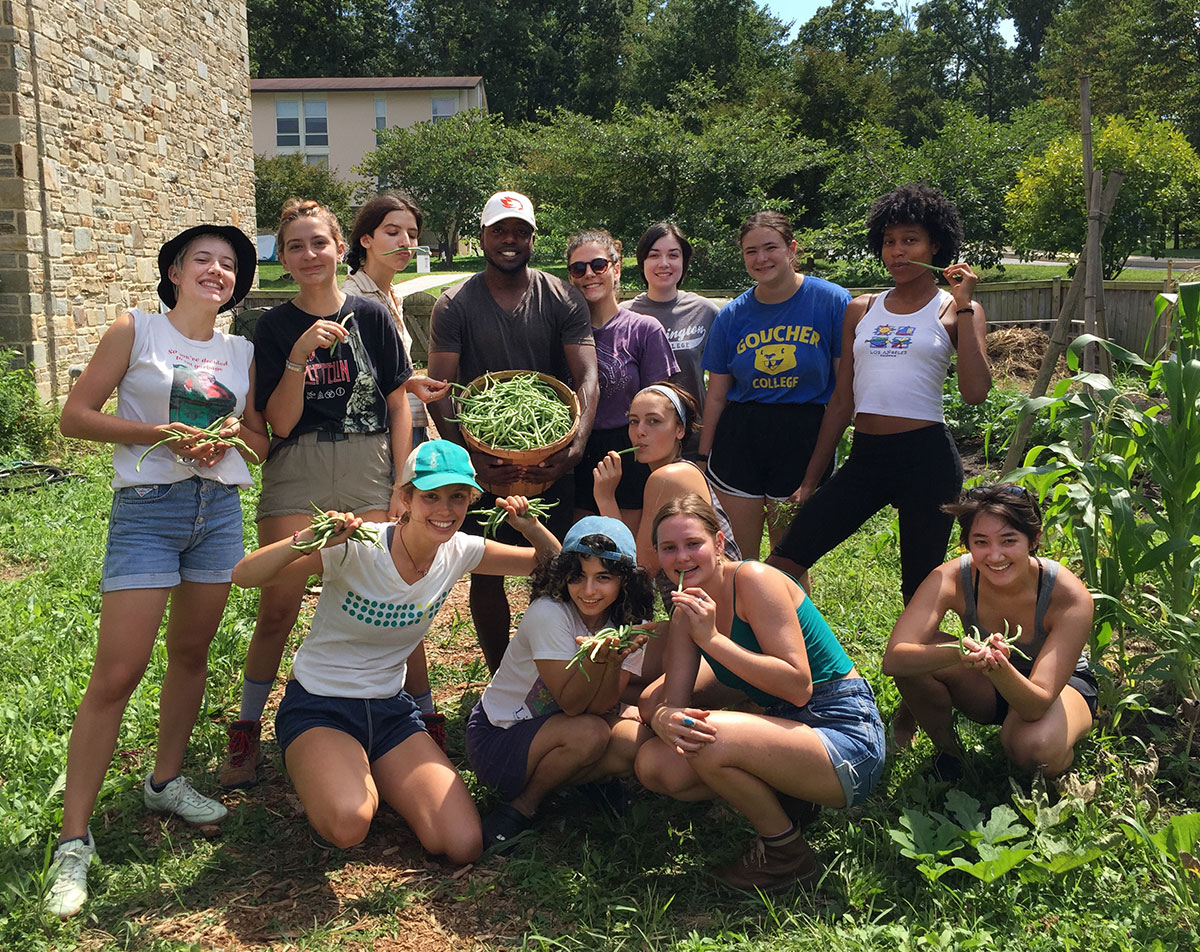 What would you do with $1,000?
What would you do with $1,000?
Since the 2012-2013 school year, the students of the Goucher College Agriculture Cooperative (Ag Co-op) have managed a 5,000 sq. foot garden located in the center of campus. Ag Co-op are the people who contribute, in any way, to the sustainability of the community garden. Our mission statement is to cultivate and nurture an intentional and inclusive space of interpersonal and ecological relationships. We are cultivating a multi-purpose outdoor space that embodies respect. Through this, we commit to protecting the environment in the face of global warming. Through partnerships with the Goucher Sustainability Office and Facility management office, we have been working hard to make this space a more inviting and healing space for all living organisms. We hope to expand our space and knowledge.
What we need to complete this mission statement are Perennials, including fruit bushes. “Duke” blueberry bushes from Herring Run are $17/1 gallon and we would likely plant 6. We also are planning to extend the raised beds we currently have by bringing in 10 or more yards of compost (1 yard of compost from Hollins Organics is $43.50). We will be growing annuals from seeds in the greenhouse (cost of seeds for next year would be in the $300-$350 range). We have a wish list of tools and other garden items, including a new wheelbarrow, hoes, stakes, materials to make tomato cages, and plant labels.
Ag Co-op sells produce to the campus dining hall, managed by Bon Appetit, and encourages all of its garden volunteers to take produce in return for their hard work. We produce a wide variety of organic tomatoes, peppers, lettuce, herbs, etc. If any produce is left over, the group works to a local hunger relief organization or composts it.
JUMP TO TOP
Johns Hopkins University | Project Category: Hunger and Food Insecurity
Enactus JHU
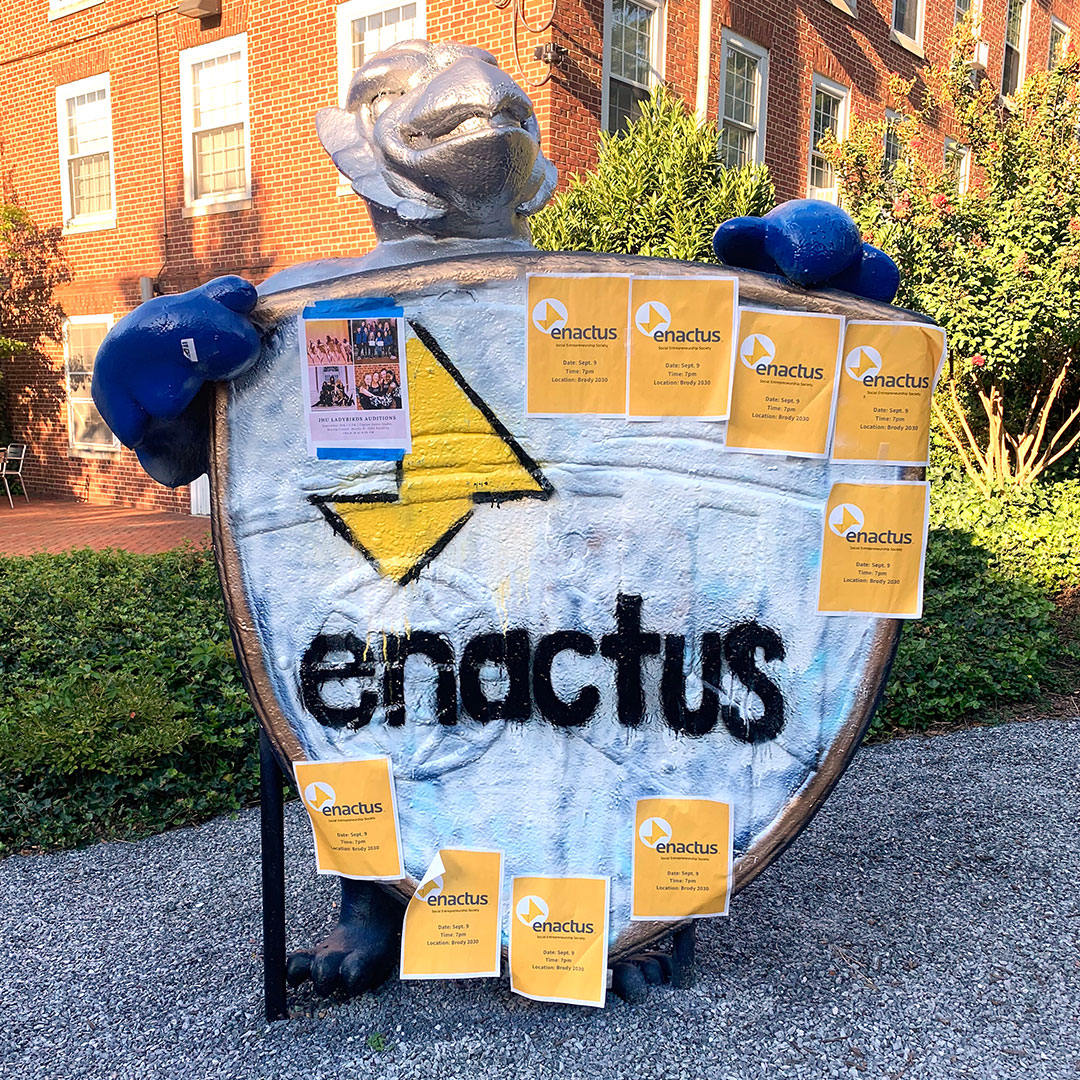 What would you do with $1,000?
What would you do with $1,000?
We will use the $1000 to address the issue of food security in Baltimore. Of the 146,077 people that live in Baltimore, 23.5% live in food priority areas (aka food deserts). Residents in food priority areas often rely on corner stores, resulting in diets that lack nutritional value. In the long run, food priority areas have significantly higher rates of premature death due to diet-related diseases, such as diabetes. Food justice is a pressing issue that is facing Baltimore, the city that Hopkins calls home. We have an obligation to work our hardest to fight the problem and strengthen JHU’s ties with the Baltimore community. We aim to teach residents how to grow fresh food at home by using our hydroponics system called Seedling.
Seedling allows residents to grow a variety of vegetables and fresh produce in compact spaces with less time/materials than conventional gardening. We are working with Bethel Street Lab (BSL), a nonprofit street-garden in Oliver Neighborhood that grows fresh food for residents to pick for free. BSL shares our goal of empowering residents to grow food at home, so together we will develop a multiple-weeks long course that teaches residents the techniques of how to garden using our hydroponics system. Upon completion of the course, residents will receive a hydroponics unit for free, paid for by revenue from selling units online. Once the concept is proven in Oliver Neighborhood, we plan to expand to more neighborhoods in Baltimore.
Our project will show JHU’s commitment to Baltimore by helping create a sustainable source of fresh food for Baltimore homes, at no cost to residents. $689 will go towards improving the scalability of our hydroponics design and creating units (equipment budget available upon request), $150 towards creating the BSL course materials and $150 towards website creation.
JUMP TO TOP
Massachusetts Institute of Technology | Project Category: Waste Prevention and Reduction
Waste Watchers
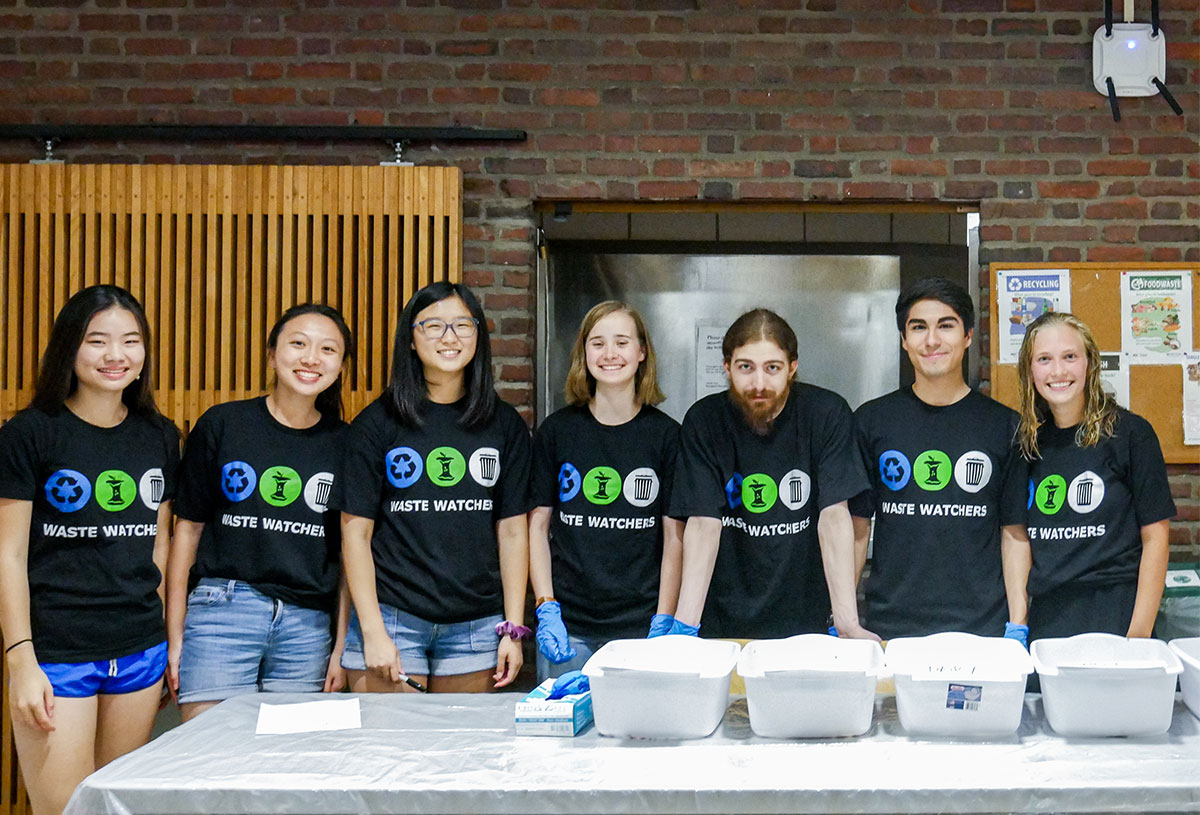 What would you do with $1,000?
What would you do with $1,000?
Waste Watchers is partnering with the MIT Office of Sustainability, MIT Dining, and Bon Appetit to reduce food waste on campus through an educational campaign. This food waste campaign strives to raise student awareness about the environmental impact of food production and food waste, and inform them of what their individual and collective “foodprint” shows to be.
We would like to run a food waste campaign during the spring term. Students (otherwise known as Waste Watchers) will conduct a pre-campaign audit at the end of February to collect the food waste that is left on people’s plates in five dining halls dining halls. Then, the leftover food waste will be measured in weight. Afterwards, during the month of March, the dining halls will have posters with educational material about environmental impact. Following this campaign, a post-audit will be April to measure if the food waste has actually reduced.
We will use the $1000 for the following items:
- Educational information sessions
- Posters
- Waste audit materials (bins, gloves, and scale)
- Tech cash gift cards, to incentivize students to fill out the pre and post-campaign surveys
- Waste Watcher T-shirts, to be easily identifiable at the dining halls
We are currently working with Mark and Gary from Bon Appetit to increase student awareness regarding the food waste programs that Bon Appetit participates in (such as Food for Free) and to help decrease food waste in dining. With the money from the grant, we hope to increase students’ awareness about their foodprint and how Bon Appetit works to reduce food waste now. If all goes well, we would also like to opensource our plan and posters so that other universities can adopt our model.
JUMP TO TOP
Savannah College of Art and Design | Project Category: Waste Prevention and Reduction
SCAD Net Impact & SCAD Back40
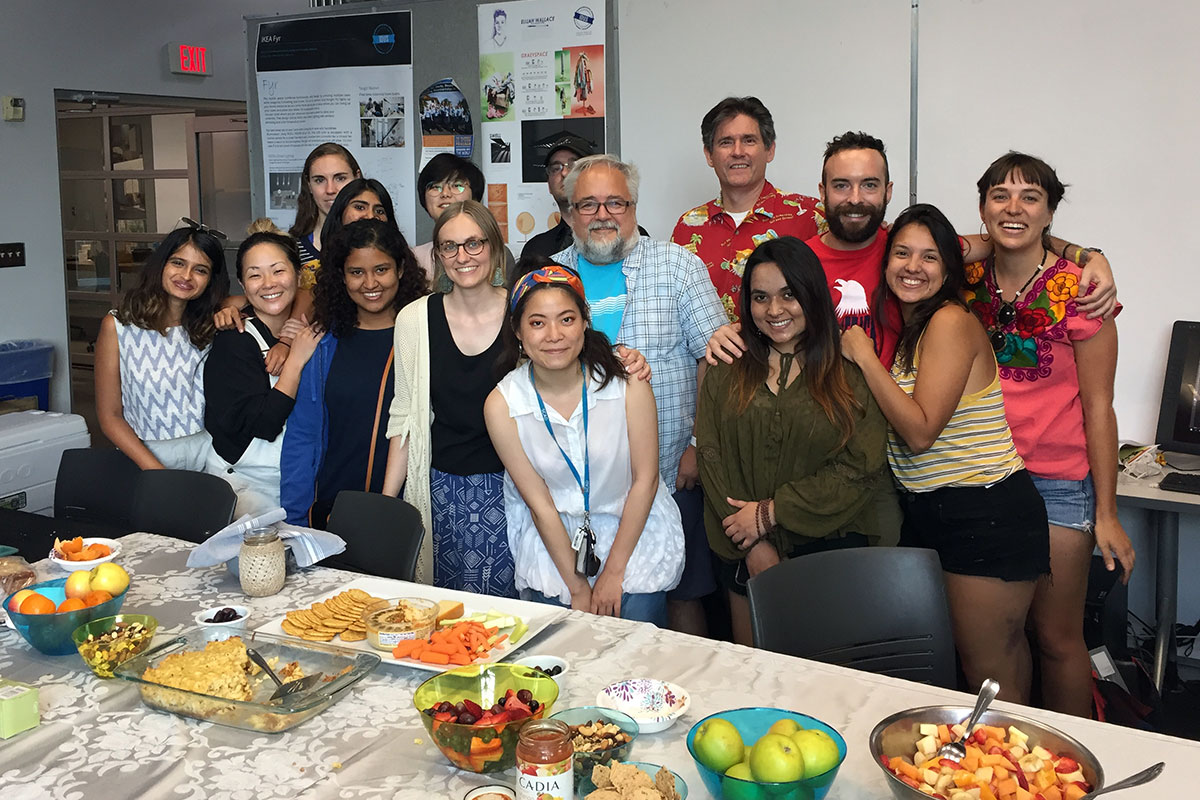 What would you do with $1,000?
What would you do with $1,000?
This year is SCAD’s Design for Sustainability (SUST) program’s 10th anniversary, giving us a unique platform for spreading regenerative ideas across campus. One of our goals is to strengthen campus collaboration in sustainable infrastructure. SCAD’s Net Impact chapter is the student organization (under the SUST program) working on campaigns to educate students on their roles in creating a sustainable society.
SCAD Back40, a new SCAD campus initiative, is a flourishing organic farm, apiary, and model for sustainable food systems. Net Impact will spearhead a collaboration between Bon Appétit at SCAD’s largest dining hall and SCAD Back40 to pilot a kitchen food scrap landfill diversion program. With the grant money, we will buy food scrap bins, design educational signage, coordinate student training and community workshops (including youth agri-education with other community partners), and leverage existing waste management relationships to kick-start the project (local jobs and community engagement!).
Additionally, we will pilot a coffee ground compost system as a means of establishing mushroom farming at SCAD Back40 that can serve Bon Apetit. This would again require similar supplies plus a compost thermometer and screen, but also provide opportunities for SCAD Back40 to build its compost skills on a manageable scale, educating students on reducing food waste in landfills and the immense ecological and human benefits of compost. We also think we can share this project with the rest of the Net Impact chapters around the world to encourage them to do something similar. This grant would help our campus live our values and elevate Bon Appétit as an innovative partner in creating a thriving campus. With this grant, the SCAD Net Impact student group can attract broader investments with other partners to create a transformative project for SCAD’s 12,000-student campus in Savannah.
JUMP TO TOP
University of Chicago | Project Category: Food Literacy, Education and Advocacy
Phoenix Sustainability Initiative (PSI) – Service Group
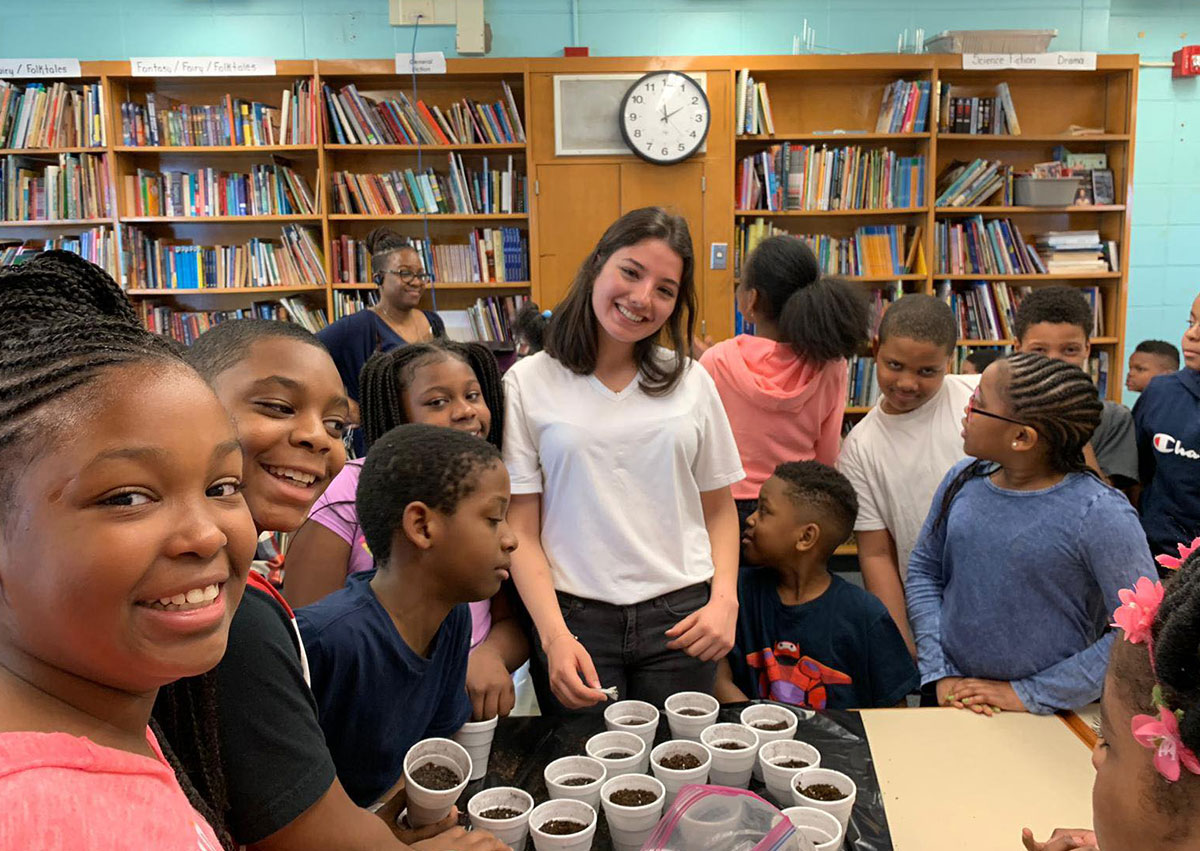 What would you do with $1,000?
What would you do with $1,000?
As Phoenix Sustainability Initiative’s Service Group, we believe that environmental education is integral to shaping environmental leaders of the future. By teaching lessons on climate change, sustainability, natural gardening, and permaculture to kids aged 6-12 years at local public schools in Chicago, we make environmental education and literacy accessible for youth in areas that lack curriculum and support. In addition to presentations, we engage students in various hands-on learning activities such as planting in the classroom or school garden, trips to community gardens in Hyde Park that strengthen their sense of community engagement, and to learn the importance of fresh produce. Ultimately, we aim our environmental education initiative to be engaging, fun, and educative for kids, but also a purposeful environmental service experience for college-aged volunteers.
Furthermore, we organize a variety of other service projects to engage university students in positively impacting the environment in our local neighborhoods. For instance, we help transform community gardens on campus and near Hyde Park to support safe neighborhood spaces. This year, we’re planning to expand volunteering to donating our own produce from our campus garden and supporting the Hyde Park University Church with their food programs.
Our environmental education initiative in particular has received highly positive feedback this past year. A $1,000 grant will greatly support buying gardening supplies (e.g. seedlings, soil, tools) to fully engage our students and expand our impact to more schools. Unfortunately, most of our school partners are unable to fund the supplies and our student group budget is limited. This grant is important for the Phoenix Sustainability Initiative’s Service Group to continue our projects with ease at this pivotal time to shape environmentally conscious youth.
JUMP TO TOP
Wesleyan University | Project Category: Campus Farms and Gardens
Long Lane Farm
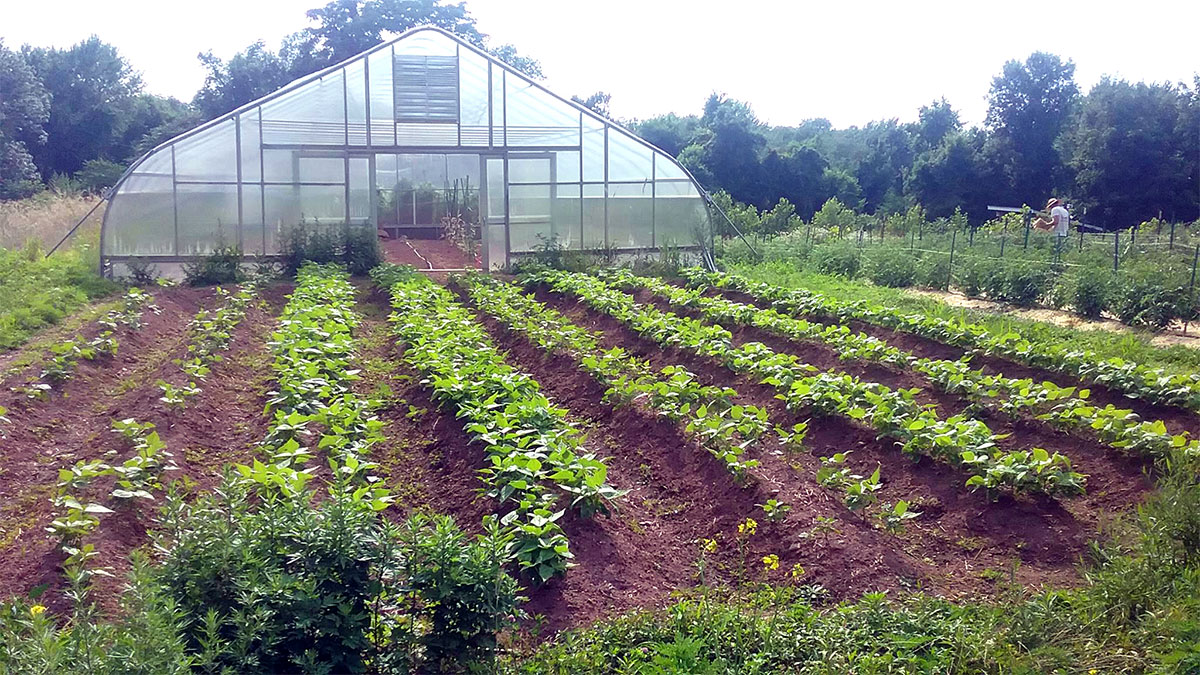 What would you do with $1,000?
What would you do with $1,000?
Long Lane farm is in urgent need of repairs to our two hoophouses. They are crucial to our vegetable production, providing warmth and shelter to keep two plots of our farm growing through the winter. This allows us to continue to grow food for Bon Appetit, the North End Farmer‘s Market, and donations to Middletown food justice organizations.
The maintenance of our hoophouses is key to keeping up with our farming practices. Over its 15-year history, Long Lane Farm has demonstrated its value to the university and the Middletown community alike. Students attribute their experiences at Long Lane to jumpstarting their careers in agriculture and food distribution. The farm has been a site for research and academic projects, from soil analysis labs to theater performances. We are dedicated to sustainable practices and are currently finalizing a conservation plan with the USDA that affirms our commitment to growing and tilling in an ecologically-friendly way. Long Lane is also essential in completing the waste loop at Wesleyan, taking in compost from across campus.
The winter is a critical time for Long Lane, because local soup kitchens and food pantries receive little fresh produce; our hoophouses allow us to keep up donations of greens throughout the season. They play a key role in our learning as Wesleyan students, providing an example of how farms can adapt to challenges like seasonal change and allowing us to continue learning hands-on year round. This is important for students who rely on income earned from working on the farm, because working inside the hoophouses is the main source of work during colder months. Currently, the back panels of both houses are in complete disrepair, leaving our plots unsuitable for winter planting. Professional repairs are required, which we hope to complete before the frost comes.
JUMP TO TOP
Wheaton College | Project Category: Campus Farms and Gardens
People’s Choice Winner: Student Government’s Campus Sustainability Committee
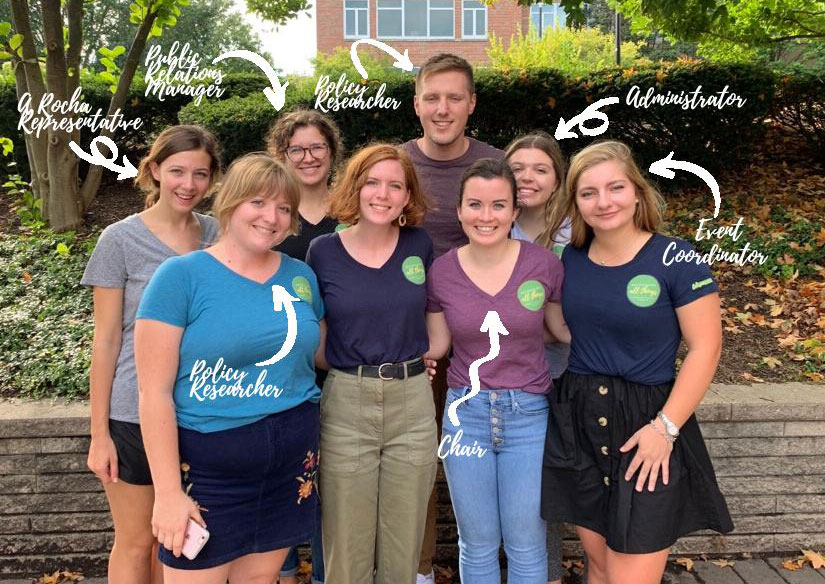 What would you do with $1,000?
What would you do with $1,000?
The Wheaton College Campus Sustainability Committee requests a $1000 grant to build a campus garden. Our committee plans to use $800 to construct the garden and $200 for educational programming. A campus garden would provide students the opportunity to participate in their own food production and to address local food insecurity, while simultaneously teaching students and community members the importance of sustainability.
Our committee plans to partner with the Bon Appetit staff to ensure that food from the garden is used in the dining hall and advertised as local food production. Raul Delgado, the Wheaton Bon Appetit liaison, has already agreed to use herbs produced in the garden. As the garden continues to grow in size and productivity, produce will also be donated to help combat food insecurity in the Wheaton community. We hope to accomplish this distribution through a preexisting partnership with the GardenWorks Project, a nonprofit that collaborates with area food pantries to increase local food production and improve food security.
In addition to crops, current blueprints for the garden include native prairie meadows that would increase biodiversity, reduce erosion, sequester carbon, and conserve water. The garden would also contribute to the campus aesthetic, support honeybee populations, and allow students to connect with and learn about the natural world. Garden upkeep would be the responsibility of students enrolled in ecology/agriculture courses; professors who support the project have agreed to integrate this element into their coursework. Educational programming would include a “groundbreaking” event to educate the campus about the purpose of the garden.
A Wheaton College garden would benefit students and the broader community. It offers opportunities to raise awareness about food insecurity, local food production, and sustainable agriculture. With proper funding, Wheaton’s campus garden can become an important example of suburban food production in the larger Chicago area.
JUMP TO TOP
The Semifinalists
- Cornell College (Cornell College Bee Interest Group)
- Eckerd College (Eckerd College Garden Club)
- Hillsdale College (The Roots Project)
- Johns Hopkins University (Blue Jay’s Perch)
- Knox College (Students for Sustainability)
- Santa Clara University (Food Recovery Network)
- The Thacher School (Thacher Environmental Action Committee)
- University of Chicago (Food Recovery Network)
- Wesleyan University (Residential Composting)
- Whittier College (POET Food Security)
Cornell College | Project Category: Campus Farms and Gardens
Cornell College Bee Interest Group
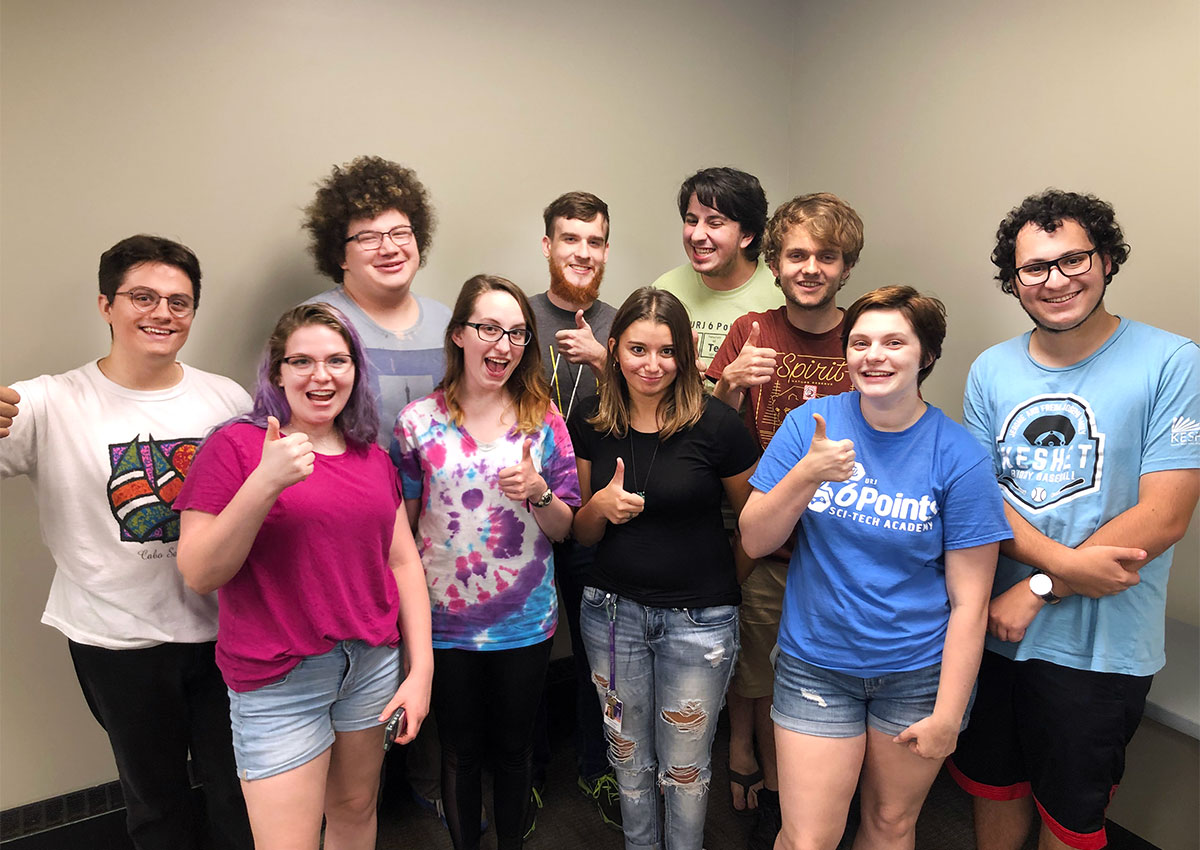
What would you do with $1,000?
The dream of the Cornell College Bee Interest Group is simple. The college has given us an acre of land, and we want to turn it into a garden and pollinator-safe space. $1,000 would go to purchasing a hive of honey bees, which would pollinate the surrounding farm lands. We are located in a farm town in rural Iowa, and Bon Appetit frequently sources from these family run farms. A colony of honey bees would contribute to the continued success of these crops.
It would also go to landscaping our acre of land. We are in the process completely transforming an overgrown orchard into a garden, which will include native Iowa wildflowers, prairie grass, and a community planting space. The community planting space would be a place for citizens of Mount Vernon and Cornell Students to connect with nature and enjoy the simple act of growing their own food.
JUMP TO TOP
Eckerd College | Project Category: Campus Farms and Gardens
Eckerd College Garden Club

What would you do with $1,000?
As busy overworked college students, we often find it hard to take care of ourselves. Struggling to find time to exercise and nourish ourselves is a problem that many students face. The Eckerd College Garden Club has allowed us to find a space of peace, where we can heal the earth while nourishing our bodies.
It is a garden that relies solely on volunteer work to function. We have a large percentage of our campus coming out to volunteer their time helping us but we often find it difficult to provide them all with the proper tools to help. A lot of our work is done by hand or with older tools which can be dangerous for students to use. Being awarded this grant from Bon Appetit would allow us to purchase tools to help increase the efficiency and safety of our volunteers.
JUMP TO TOP
Hillsdale College | Project Category: Waste Prevention and Reduction
The Roots Project
 What would you do with $1,000?
What would you do with $1,000?
The Roots Project at Hillsdale College is a sustainability initiative that began with a simple realization of the immense impact that small change can have within a tight knit community. Our campus in small-town southern Michigan is home to immense natural beauty, yet we are just beginning to realize the scope of our responsibility to take care in the way we treat our beautiful landscape. This very realization has sparked a revived effort towards reducing our environmental impact, beginning with eliminating food waste.
Throughout this past summer, The Roots Project has organized plans for a composting program that will help Hillsdale College reach our goal of reducing campus waste by 50% within the next 5 years. The resources provided by this grant opportunity will be designated towards implementing that very program—specifically by building a three-stage cement compost bin to eliminate kitchen food waste, purchasing bins to create a user-friendly system for on-campus disposal, and investing in compostable food packaging to reduce plastic use for all carry-out cafes. We have goals to dig roots in a big way by planting a campus garden within the next year, but in order to maximize the fruits of our harvest, our efforts now are focused on composting in order to regenerate our soil to provide more nutrient dense produce in the future.
Over the past year, an exciting dialogue has begun at Hillsdale College surrounding a more sustainable approach towards tackling environmental issues—one that I am confident will grow exponentially as we continue to improve our waste reduction practices and lessen our overall impact. The Roots Project seeks to spread awareness surrounding the environmental impacts of our food choices and we are eager to see the ways in which implementing this composting program will be the impetus for such a change.
JUMP TO TOP
Johns Hopkins University | Project Category: Campus Farms and Gardens
Blue Jay’s Perch
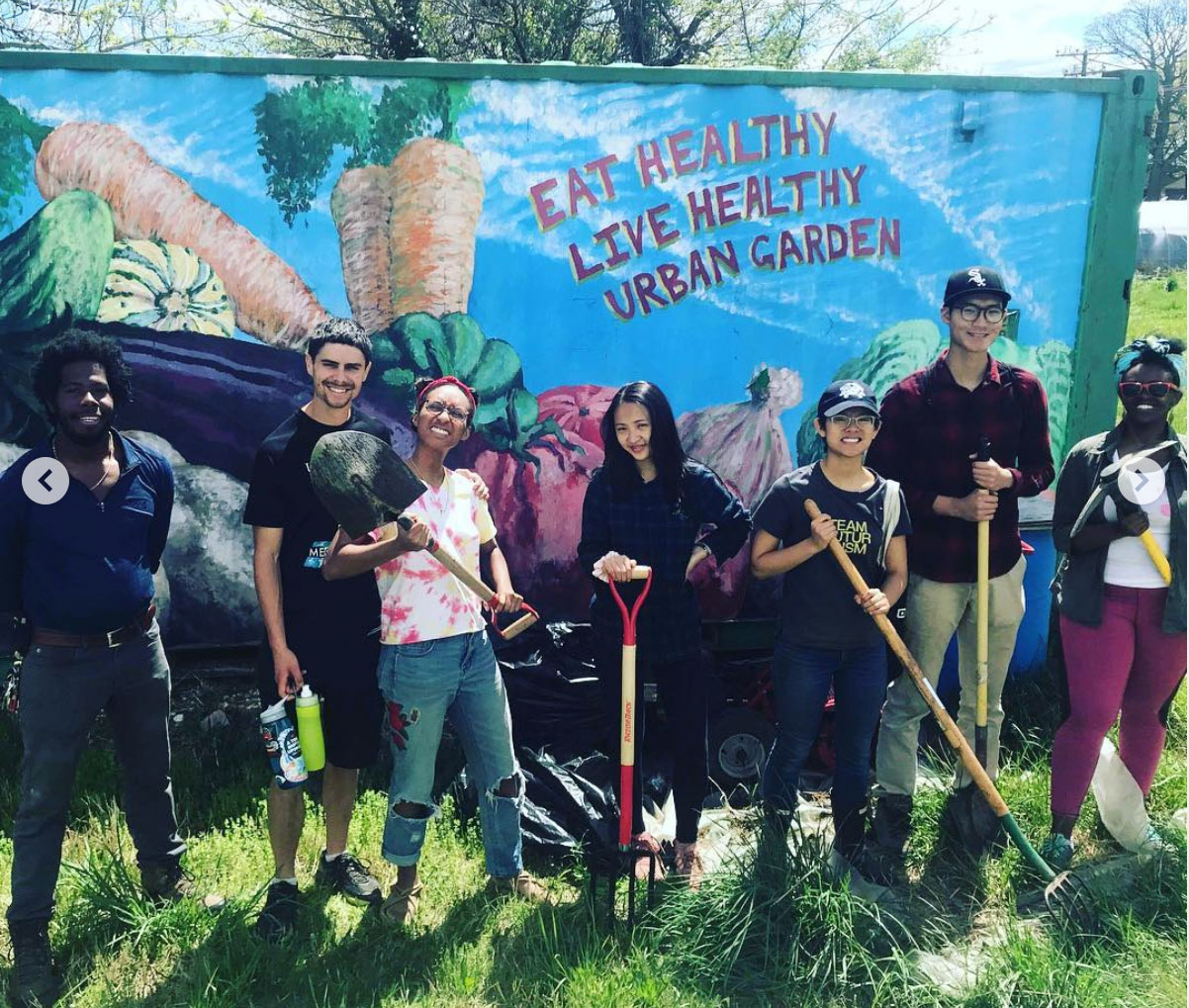 What would you do with $1,000?
What would you do with $1,000?
Started in 2012, the Blue Jay’s Perch is a beautiful space for students to learn and practice urban gardening while also helping to reduce food insecurity in Baltimore by donating some of the produce we grow. We have both individual plots that community members can use free of charge to grow their own produce as well as communal plots that everyone can harvest from. We aim to educate everyone about food systems and sustainable growing methods while also serving as a community gathering space.
The Perch has grown a lot since its inception – our most recent project is building a hoophouse which we plan to use for seed starting. However, the Perch relies almost entirely on student volunteers and the leadership of a student Garden Manager. The Perch is currently not very well supported administratively or financially by Johns Hopkins, and the Garden Manager alone is responsible for fundraising, facilitating garden workdays, recruiting volunteers, organizing produce donation, managing community members, and communicating with university administration. The role of Garden Manager used to be a paid Federal Work Study position, but the funds have recently been cut, which leaves Garden Managers uncompensated.
Winning this grant would allow the Perch to compensate Garden Managers for their work as well as provide funds for projects like our hoophouse and general garden supplies/repairs, which would in turn help us grow sustainably as an organization and ensure our impact for years to come.
JUMP TO TOP
Knox College | Project Category: Campus Farms and Gardens
Students for Sustainability
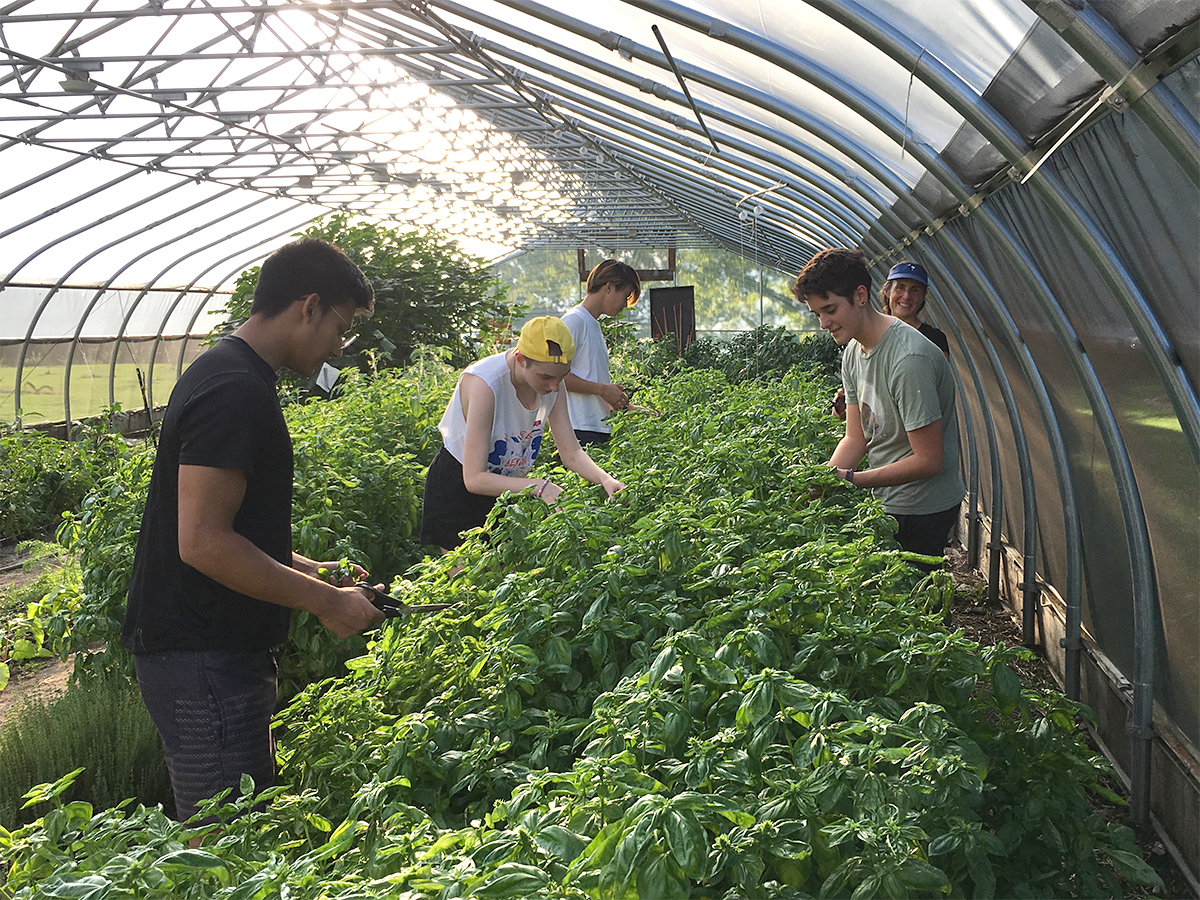 What would you do with $1,000?
What would you do with $1,000?
Students for Sustainability at Knox College works closely with our on-campus farm. The Knox Farm produces food for the cafeteria to provide local, healthy, and sustainable food for the students. The Farm also serves as a “living laboratory” and provides hands-on experiences to students through volunteer hours or to enhance subject matter with outside class learning. With this grant, we are hoping to construct a new composting system for the farm’s use and to add perennial shrubs and herbs to our emerging food forest.
The Knox Farm is building a new composting system. We will have three double-units (6 bins total) to compost farm waste. One unit is built, but we do not yet have the supplies for the remaining two units. We currently work with a commercial compost vendor to collect the food waste from our dining hall, but we do not receive any of the compost they create. With this new composting system at the Knox Farm, we will be able to close the loop, creating healthy compost on-campus to add back to the soil, which will recycle nutrients and help production.
Last spring, we added a food forest to the Farm by planting 15 fruit trees. The hope is to integrate perennial herbs and shrubs around the trees, creating guilds. The herbs and shrubs will be a combination of medicinal and food crops such as aronia, elderberry, and currants. This will provide perennial crops and will also serve as a demonstration of permaculture techniques that can be done in anyone’s residential yard.
With this grant we would be able to reduce waste, get closer to closing the campus’ food system loop, and showcase ways to reduce waste and grow food in healthy, ecological ways.
JUMP TO TOP
Santa Clara University | Project Category: Hunger and Food Insecurity
Food Recovery Network
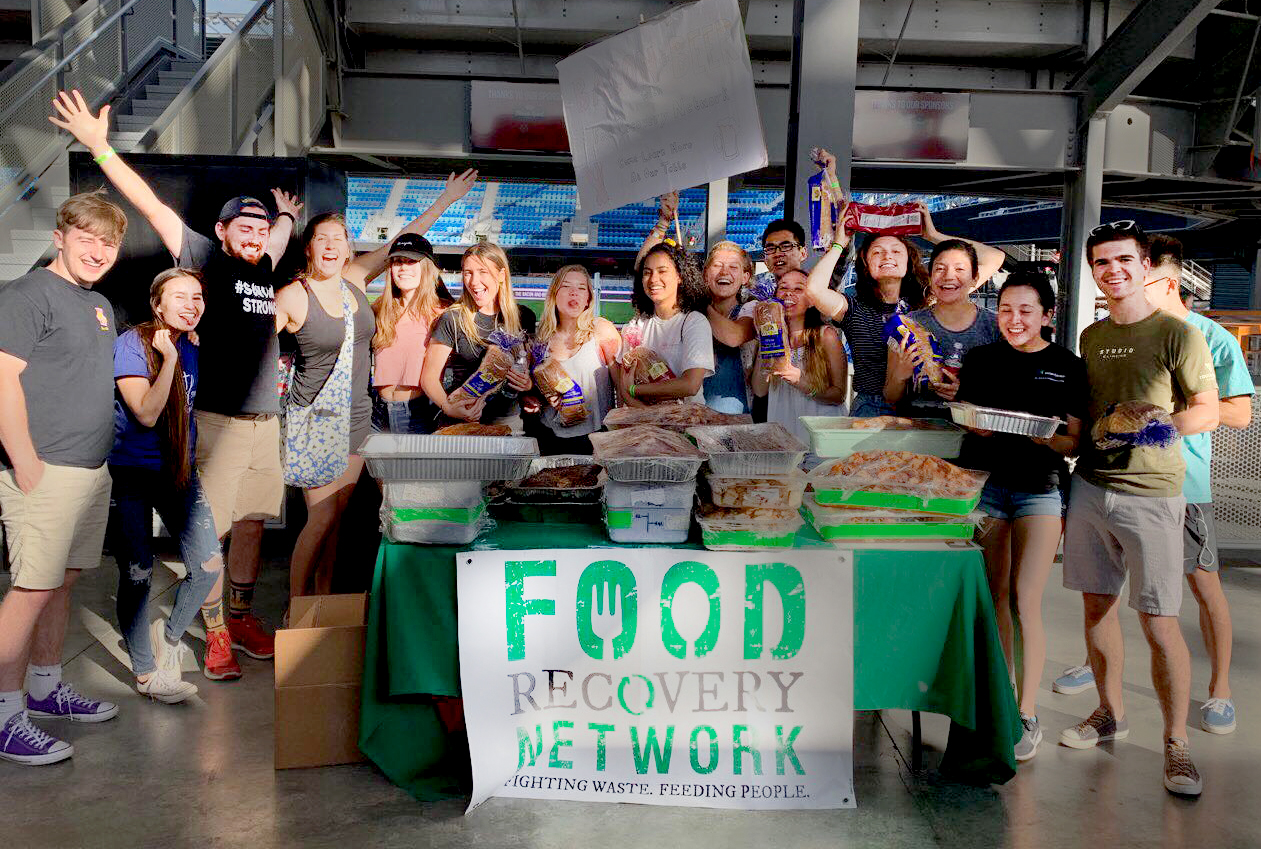 What would you do with $1,000?
What would you do with $1,000?
In 2014, the Santa Clara University (SCU) FRN dream was set into motion. A small, multidisciplinary group of juniors and seniors, driven by their passion for sustainability and reducing waste, formed our school’s first chapter and began inspiring others to join the cause. From the very beginning, SCU FRN was founded on individual concerns for the environment and local community. Nowadays, some might say that those concerns are still a bit too individual. SCU continues to grow in population and enthusiasm but SCU FRN struggles behind, failing to garner interest from the incoming classes. The dream still lives on each Monday and Thursday during food recoveries, but all the days in between make SCU FRN seem like a fever dream. Moreover, our main dining hall partners has cut back on the amount and types of food they can provide to us—in response to SCU FRN’s more limited capacity to recover food.
It’s been five years of decline, but this stops in 2020. Our new leadership team is inspired to revamp our image and refresh our supplies. Two purchases would help us achieve our goal sooner: one major purchase of recovery bins capable of storing hot food items and also sealing properly; and one minor purchase of stickers, volunteer gear, or other marketing materials. With receipts for those in our back pocket, SCU FRN would be ready to launch a couple events highlighting our presence on campus and why the work is important. Our chapter has operated thus far like shadows in the night (or more accurately, shadows between 9am and 2pm twice a week), but we’re ready to take steps forward towards a more successful, seen future.
JUMP TO TOP
The Thacher School | Project Category: Campus Farms and Gardens
Thacher Environmental Action Committee
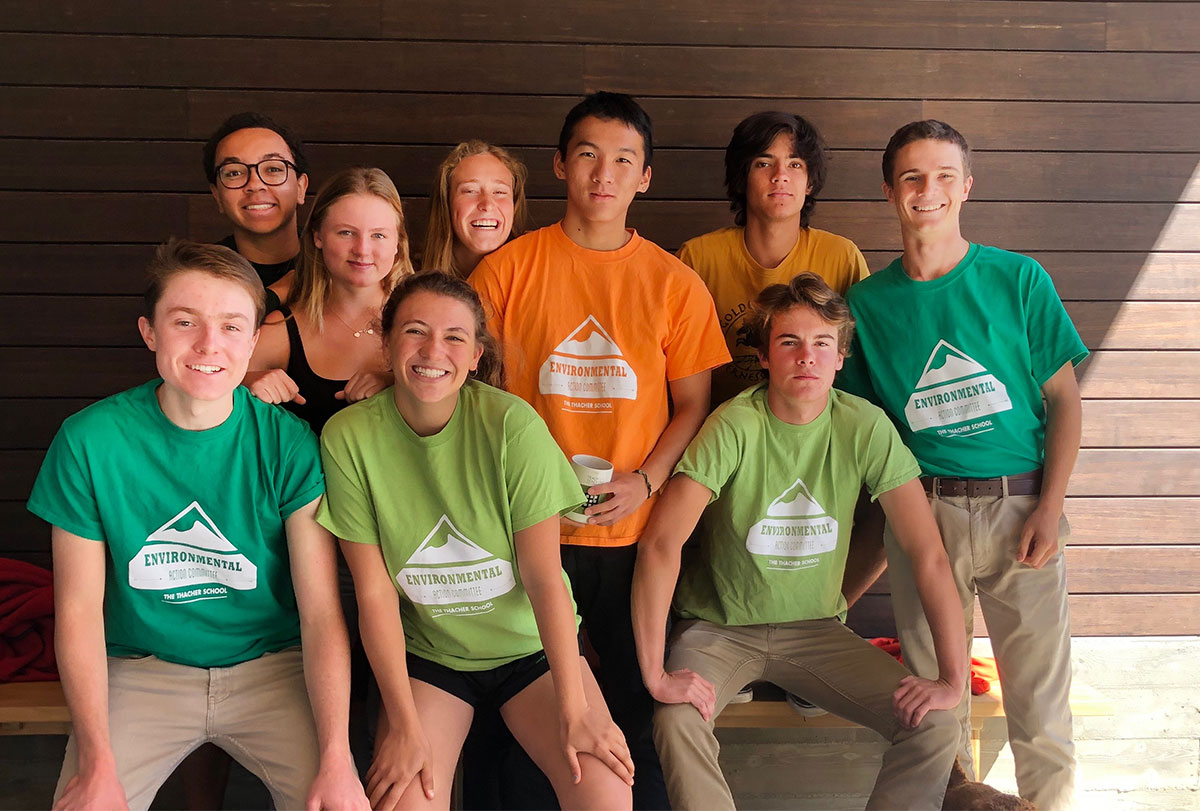 What would you do with $1,000?
What would you do with $1,000?
The Thacher School has worked consistently on its sustainability efforts and local engagement for many years. As a small high school with a strong environmental program and community focus, there are always things that can be improved with $1000. The Environmental Action Committee, Thacher’s student-run environmental club, recognizes and appreciates Bon Appetit’s emphasis on local and sustainably-sourced ingredients and would benefit from further funding for visits to local farms to educate our students. An objective this year is to include more signage and communication regarding where our food is coming from so that students, faculty, and staff can further understand our commitment to environmentalism in our dining hall. We also would like to ameliorate our food-producing systems on campus by increasing community engagement and educational opportunities as well as working on the animal husbandry programs we have. Our bee and pig programs were founded in 2011 and our chicken program in 2016. One of our goals for this year is improving the humane and ethical treatment of our food animals. For example, installing a new chute in the pig pen to facilitate more humane handling and medication of the pigs.
Adapting our systems and acquiring the funds from development can be difficult and the Bon Appetit grant money would greatly allow us to positively impact these already established and very popular programs. Therefore our Environmental Action Committee could do a lot with $1000, from community education to animal husbandry improvements. We would greatly appreciate the support from Bon Appetit in our efforts towards creating a more sustainable and resilient campus and world.
JUMP TO TOP
University of Chicago | Project Category: Hunger and Food Insecurity
UChicago Food Recovery Network
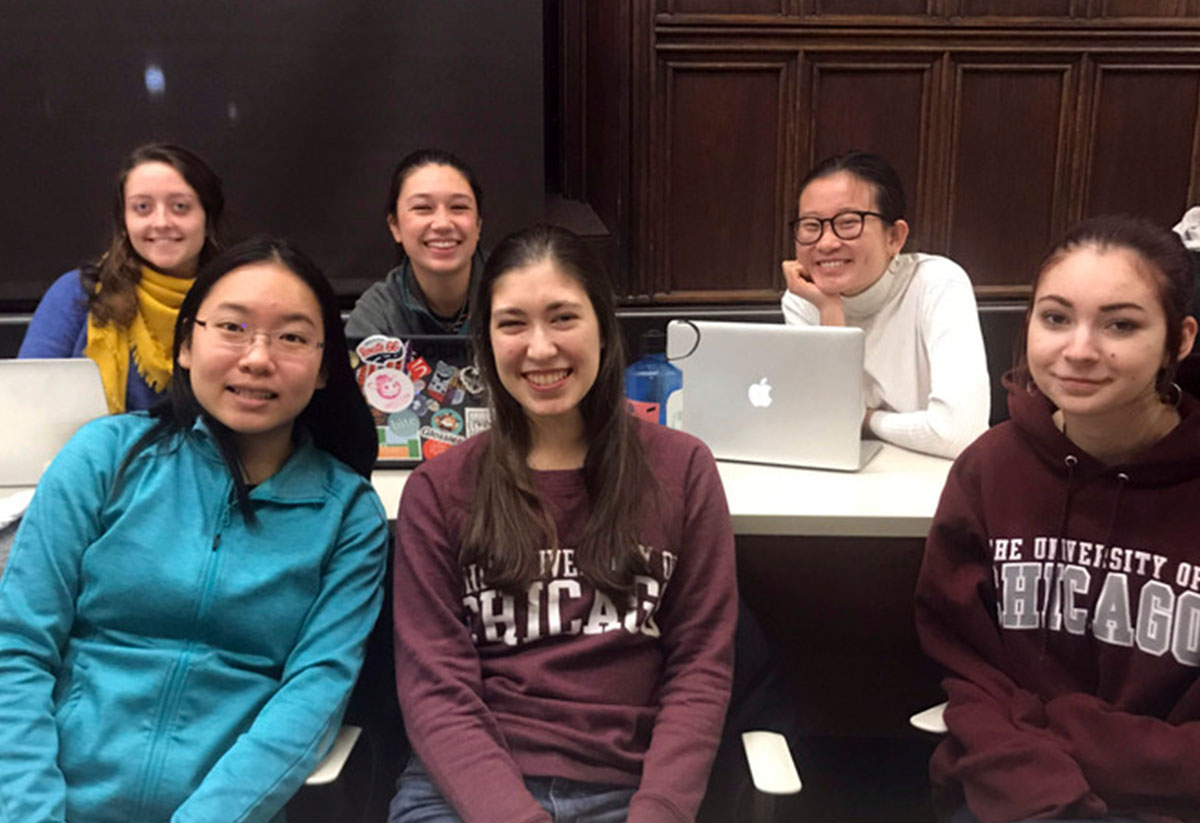 What would you do with $1,000?
What would you do with $1,000?
As UChicago’s primary student led organization dedicated to the fight for environmental justice and food sovereignty, UChicago Food Recovery has recovered over 2950 pounds of fresh food within one and a half years from the dining halls, campus organizations, and citywide events whilst educating the campus community on the importance of a sustainable and equitable food chain.
However, we still have tremendous room for growth. One of the most pressing issues on our campus is student food insecurity due to the lack of support for low income/first generation/undocumented students and the meager stipends for graduate students. To address such, we have been organizing with our Student Support Services as well as Bon Appetit Dining to implement an on campus food pantry where we would supply recovered food daily from a cafe partner. Although most logistics have been addressed, the project is moving slower than expected due to financial concerns. Therefore, we would purchase a basic refrigerator for our food pantry with around half of the $1000 grant. The refrigerator would not be exclusive for our organization’s daily donations as other campus groups would be encouraged to store leftover food from events we don’t recover from for those in need. With a refrigerator and a trial run of our food pantry, we would be able to generate the momentum needed to establish a permanent resource for the food insecure campus community.
Additionally, we would use the other half of the grant to secure reliable transportation to scale up our current recovery projects. This includes renting a U-Haul for larger recoveries from local grocery stores (especially for “ugly” produce) and restaurants or renting a zip car for last minute recoveries. Having more transportation options would allow for a larger variety of recoveries and for us to engage more students in our cause.
JUMP TO TOP
Wesleyan University | Project Category: Waste Prevention and Reduction
Residential Composting
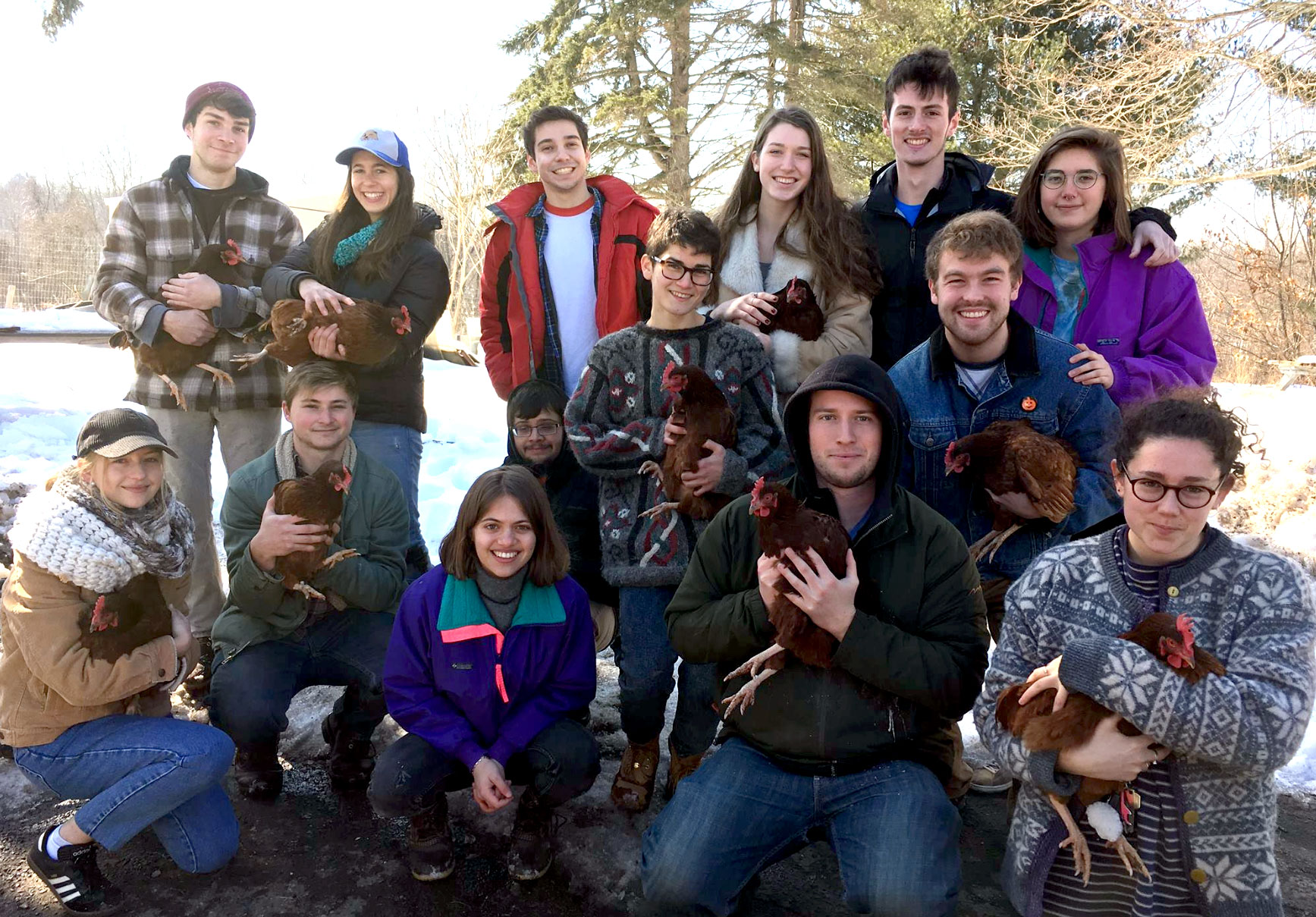 What would you do with $1,000?
What would you do with $1,000?
As Wesleyan Eco Facilitators we have advocated for sustainable living through composting initiatives. As seniors we hope to leave a lasting environmental legacy for students and strongly believe in the politics of our everyday actions. We have lead workshops explaining the process and importance of composting. The funds would contribute directly into Wesleyan’s five-year sustainability action plan which expands upon the existing climate action plan. We sent out a form asking all the senior houses if they needed a composting bucket, and in a few days, we have received 76 requests. There are over 150 senior houses and only have forty composting buckets available. Additionally, the composting earth tubs, used to mix the compost, have not been updated for several years and are currently inoperable. This directly hinders on our ability to complete the final composting step at Wesleyan, to convert the compost into healthy soil. There are currently three composting interns who are responsible for transporting food waste from senior houses to our student run organic farm. Since the earth tubs are out of commission, hundreds of pounds of waste are left scattered around the farm unable to be used. The organic waste lingers in large blue containers unable to be mixed and converted.
We believe in returning nutrients back to the soil and know that composting reduces methane emissions and lowers carbon footprint. The rate of composting has increased nationwide by 4% since 2014 (epa.gov). We have experienced this firsthand and made it a personal endeavor to establish a wider network of committed environmental activists. We started this initiative our freshman year in order to encourage the Wesleyan student body to live according to environmental ethics, and that we can make a difference even if it is as small as putting a banana peel in a composting bin.
JUMP TO TOP
Whittier College | Project Category: Hunger and Food Insecurity
POET Food Security
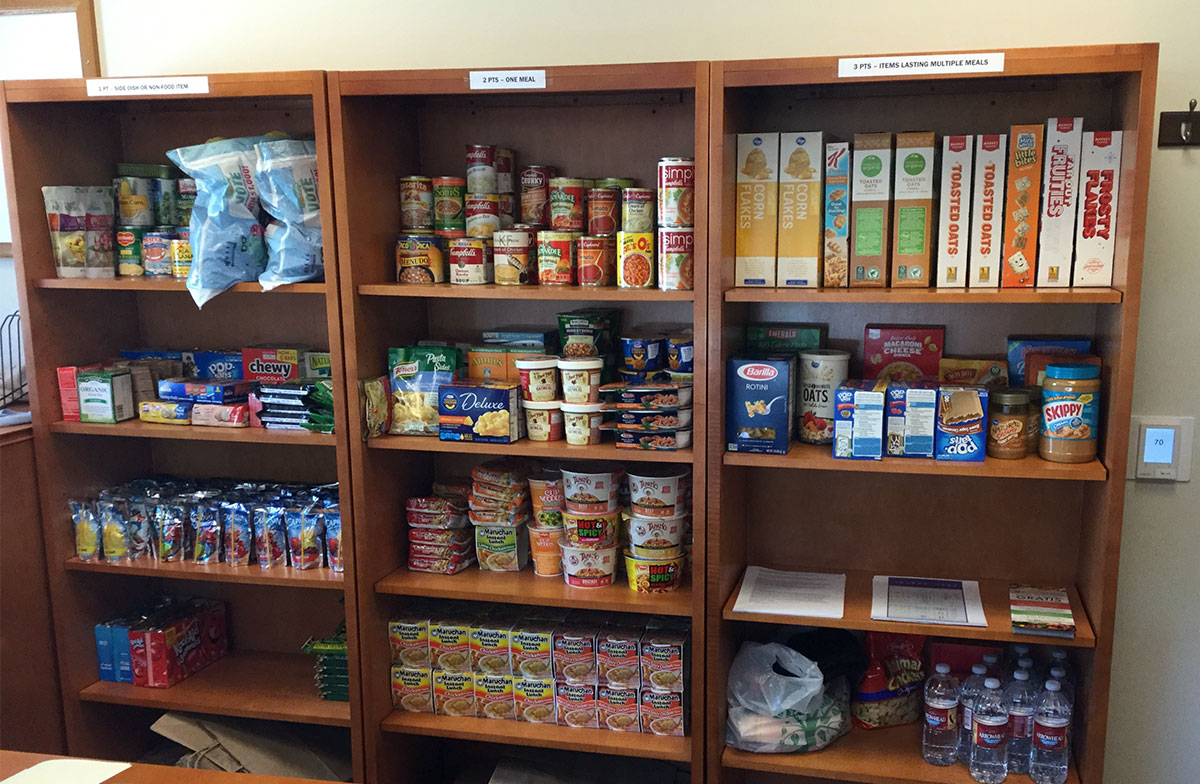 What would you do with $1,000?
What would you do with $1,000?
Whittier College is excited to submit this grant request for $1,000 to support our need to Pack the Pantry. Last year, personnel of Whittier College became increasingly aware of the food security challenges of our students. It was decided that the DOS emergency fund would support a small number of food vouchers so that students could immediately access a meal in our cafeteria and to create a sustainable program and further assess the needs, two groups were formed.
The Educational subcommittee –with the support of Bon Appetit-successfully delivered a series of 3 cooking classes, educating students on ways to prepare healthy meals on a budget. When completed, each participant received a market gift card and qualified for a free lunch program.
The Food Pantry subcommittee planned and launched a 6-week pilot program, receiving donations during a food drive from staff/faculty and community members. The staff of Bon Appetit developed a point system that allowed equitable access to the available food items. Student Senate has made a donation to purchase a refrigerator to expand food supplies and include dairy, meat and produce. While the pilot program was successful, it also helped raise awareness about food insecurity on campus.
Whittier College is committed to a sustainable food security program and has funded a student intern position to grow the food pantry program. Connections with community providers for food donations are underway but not happening quickly, so our current need is to Pack the Pantry with food, for a grand opening, increasing community awareness and encouraging students to move out of the shadows and make known their struggles with food insecurity. The social, emotional, academic and physical demands of college life should not be a struggle due to hunger.